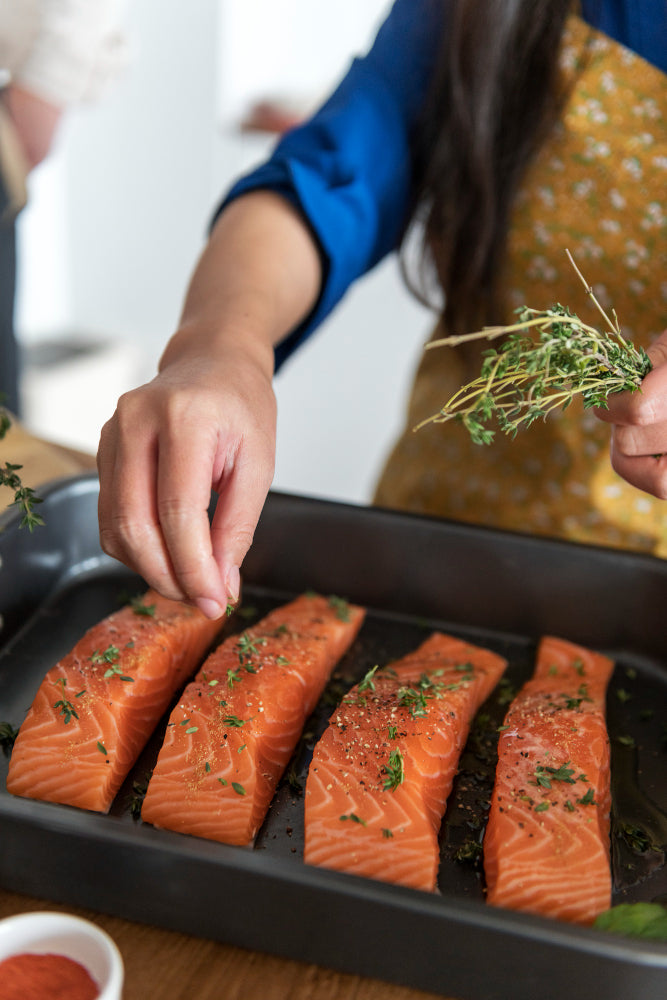Can You Eat Smoked Salmon When Pregnant?


During pregnancy, nutritional intake becomes paramount due to its direct impact on both maternal and fetal health. Healthcare professionals emphasise the importance of a balanced diet that supports the developmental needs of the fetus while maintaining the mother's health. However, this period also necessitates vigilance over potential dietary risks, including the consumption of certain types of fish due to risks of mercury contamination and bacterial infection.
Smoked salmon, a popular delicacy, comes under scrutiny during pregnancy due to concerns over foodborne illnesses and its nutritional content. The question of whether pregnant women can safely consume smoked salmon is complex and requires a nuanced understanding of the types of smoked salmon and the associated health risks and benefits.
Remember to always consult your doctor if you have any concerns or are unsure if you can consume certain foods.
Smoked salmon is traditionally prepared through two primary methods: hot-smoking and cold-smoking. Hot-smoked salmon is cooked and smoked at higher temperatures, which gives it a flaky texture. In contrast, cold-smoked salmon, typically served in thin slices, is smoked at lower temperatures, retaining a more silky texture. The method of preparation may affect the safety and nutritional value of the salmon when consumed during pregnancy.
Smoked salmon is lauded for its high content of omega-3 fatty acids, essential for fetal brain development, and is also a good source of protein, vitamins, and minerals necessary for pregnancy. However, it is also high in sodium, which necessitates moderation.
Smoked salmon is commonly consumed in sandwiches, on bagels with cream cheese, in salads, or as part of dishes such as scrambled eggs or pasta. The diversity in consumption methods influences the risk and nutritional profile when considered for a pregnancy diet.
The primary concern with consuming smoked salmon during pregnancy is the risk of Listeria monocytogenes contamination, a bacterium that can cause listeriosis, a potentially severe infection in pregnant women, leading to miscarriage, stillbirth, or severe illness in newborns. Other risks include potential exposure to other foodborne pathogens such as Salmonella and Vibrio vulnificus.
Pregnant women have a compromised immune system, making them more susceptible to foodborne illnesses, which can have more severe outcomes in pregnancy. Dr. Emily Jenkins, an obstetrician, states, "The altered immune state of pregnant women increases their vulnerability to listeriosis, which can result in significant adverse outcomes for the unborn child."
The risks vary significantly between hot-smoked and cold-smoked salmon due to differences in preparation and cooking temperatures. Hot-smoked salmon, typically cooked at higher temperatures, may present a lower risk of Listeria contamination compared to cold-smoked salmon.
Health organisations like the National Health Service (NHS) and the Food Standards Agency (FSA) in the United Kingdom provide specific guidelines on seafood consumption during pregnancy. They recommend that pregnant women can safely consume smoked fish like salmon if it has been thoroughly cooked or is part of a prepared dish like a casserole.
For those who wish to include smoked salmon in their diet, opting for fully cooked or canned versions can minimise risks. It is advised to consume smoked salmon in moderation and ensure it is sourced from reputable suppliers.
The recommended portion size and frequency of smoked salmon consumption during pregnancy are to keep it within the limits set for oily fish, which is no more than two portions per week. This moderation ensures that pregnant women can benefit from the nutritional value of smoked salmon while minimising any potential risks.
The consumption of smoked salmon during pregnancy can be beneficial due to its rich nutritional profile, particularly in omega-3 fatty acids and protein. Omega-3 fatty acids are crucial for the neurological and visual development of the foetus. Dr. Eleanor Hayes, a leading obstetrician, states, "Omega-3 fatty acids, particularly DHA and EPA, found in smoked salmon, are essential for the development of the baby's brain and retina." Smoked salmon is also a good source of protein, which is vital for the growth of fetal tissue, including the brain, and helps support the mother's body as it adapts to pregnancy.
However, it is paramount to consider the balance between benefits and risks due to potential contaminants such as listeria or high levels of sodium. The NHS recommends that pregnant women should consume smoked salmon in moderation and ensure it is from a reliable source. According to the Food Standards Agency, pregnant women should limit their intake of smoked fish to no more than two portions per week to mitigate the risk of exposure to harmful bacteria and high sodium levels.
While smoked salmon offers nutritional benefits, it is imperative to balance these against potential risks. The concern with smoked salmon, specifically for pregnant women, revolves around the risk of listeria contamination. Listeriosis, though rare, can be particularly severe during pregnancy, leading to complications such as miscarriage or stillbirth. Dr. Michael Brooks, a food safety expert, advises, "Pregnant women should ensure that any smoked salmon they consume is thoroughly cooked or pasteurised to reduce the risk of listeria."
Moreover, the sodium content in smoked salmon can contribute to increased blood pressure and swelling, conditions already prevalent in pregnancy. Hence, monitoring intake is crucial. The nutritional benefits of smoked salmon can be obtained if consumed in moderation and as part of a varied diet, following food safety guidelines.
When comparing smoked salmon to other types of fish and seafood, it's essential to consider the levels of mercury, which can be detrimental to a developing foetus. Smoked salmon typically contains lower mercury levels than predatory fish such as shark, swordfish, or marlin. The NHS and the Food Standards Agency recommend that pregnant women avoid high-mercury fish and opt for safer options like smoked salmon, sardines, or trout, in moderation.
However, it is also significant to compare the omega-3 fatty acid content. While smoked salmon is a good source, mackerel and herring offer higher levels and may be considered safer alternatives due to lower risk of listeria when properly cooked.
For those seeking alternatives to smoked salmon, there are numerous safe seafood options and plant-based sources of similar nutrients. Safe seafood alternatives include canned tuna (in limited amounts due to mercury content), anchovies, and haddock. These options provide beneficial omega-3 fatty acids without the higher risks associated with smoked or raw fish.
Plant-based sources of omega-3 fatty acids include flaxseeds, chia seeds, and walnuts. Dr. Anna Peterson, a dietician specializing in pregnancy nutrition, suggests, "Incorporating plant-based sources of omega-3s can be a safe and effective way to ensure adequate nutrient intake for those avoiding fish during pregnancy."
Moreover, for those looking to replicate the flavour profile of smoked salmon without the risk, smoked tofu or smoked nuts can serve as a culinary substitute in recipes.
Proper handling and preparation of smoked salmon are critical to minimise health risks. A step-by-step guide includes ensuring the salmon is purchased from a reputable source, stored at the correct temperature (below 5°C), and consumed by the use-by date. It is also advisable to cook smoked salmon thoroughly until steaming hot throughout before consumption during pregnancy.
For storing leftovers, they should be refrigerated promptly and consumed within 24 hours. When reheating, ensure the salmon is heated thoroughly to kill any potential bacteria. These steps, when strictly followed, can reduce the risk of listeria contamination.
Yes, you can eat smoked salmon when pregnant, but it should be consumed in moderation and must come from a reliable source. It's important to ensure that the smoked salmon is stored and prepared correctly to minimize the risk of listeria contamination. Pregnant women are advised to limit their intake and follow food safety guidelines.
According to the NHS, smoked salmon is considered safe for pregnant women if it has been properly stored and handled. However, the NHS recommends eating smoked salmon in moderation due to the risk of listeria and high levels of sodium. It is advisable to include it as part of a varied diet.
Yes, you can eat salmon while pregnant. In fact, salmon is a good source of omega-3 fatty acids, which are important for the development of the baby's brain and eyes. However, it is recommended to eat cooked salmon rather than raw or smoked varieties to reduce the risk of foodborne illness. The NHS suggests that pregnant women can safely eat two portions of salmon or other oily fish per week.
Smoked salmon is not cooked in the traditional sense; it is cured and then smoked. There are two main types: hot-smoked salmon is exposed to heat in a smoker, which cooks the fish, while cold-smoked salmon is cured and then smoked at a lower temperature, which does not cook the fish. Therefore, cold-smoked salmon is considered raw. When consuming smoked salmon during pregnancy, it is safer to choose the hot-smoked variety and ensure it is from a reputable source.
While smoked salmon can offer considerable nutritional benefits during pregnancy, such as omega-3 fatty acids and protein, it is vital to balance these benefits against potential risks, notably listeria contamination and high sodium levels. Alternatives to smoked salmon, including other safe seafood and plant-based sources, can provide similar nutritional benefits without the associated risks. By following proper preparation and handling guidelines, pregnant women can safely include smoked salmon in their diet, contributing positively to the nutritional requirements of both mother and foetus.








Plus get the inside scoop on our latest content and updates in our monthly newsletter.